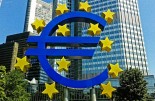Vanguard: Restraining top priority ECB
Vanguard: Restraining top priority ECB

This is a preview by Roxane Spitznagel, Economist at Vanguard, on this week's ECB meeting.
Our ECB policy outlook turned materially more hawkish over the last few weeks on the back of more persistent inflationary pressures. On Thursday, we expect the ECB to signal an end to QE in early July, which will then pave the way for a 25bps rate hike to -0.25% at the following July meeting. We expect rates to be lifted out of negative territory by the third quarter of this year.
The ECB finds itself in a challenging position: surging inflation rates warrant more aggressive rate rises, but a materially weaker economy warrants a more moderate approach. Recent ECB communication made clear that it considers inflation paramount.
In our base case we expect 100-125bps of tightening in 2022. Thereafter, we expect rates to overshoot the neutral rate in 2023 (estimated at 1.5% currently), and to reach 2.5% at the end of 2023. This is about 50 bps higher than current market pricing. A restrictive stance will likely be necessary in order to tame inflation.
Price pressures are broadening in the euro area: 60% of items are now experiencing inflation two percentage points above their long-term average. Three months ago this number was less than 40%. Services inflation has picked up to the highest rate since the euro’s introduction, which historically has been the persistent part of inflation.
Additionally, our proprietary ‘Vanguard Leading Economic Indicator’ suggests that, despite a significant slowdown, a recession is likely to be avoided this year. This further backs our view of a material ECB rate hiking cycle over the next months.
The ECB outlook is uncertain in both directions. In the event of second-round effects, we would expect the ECB to hike more aggressively than in our base case. On the other hand, a Russian gas ban would likely cause a recession in the euro area, in which case we look for the rate hiking cycle to stall. A potential relaunch of QE would be possible, in this scenario, especially in case of market fragmentation.








